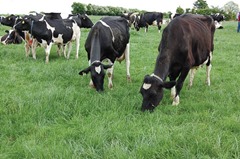Export potential a recipe for agri-food success
 Alan Taylor, Managing Partner of Arthur Cox in Belfast, casts his eye over the global agri-business sector and sees opportunities for Northern Ireland.
Alan Taylor, Managing Partner of Arthur Cox in Belfast, casts his eye over the global agri-business sector and sees opportunities for Northern Ireland.
The massive trade potential that continues to grow within the agri-food and drink sectors represents one of the key areas of the United Kingdom’s economic revival strategy.
In the context of Northern Ireland the agri-food sector has continued to defy dark clouds on other parts of the economic horizon. With annual sales currently standing at £4.4 billion it can rightly be described as one of our most significant economic sectors.
The Assembly is currently backing ambitious new plans for the formation of a single marketing organisation designed to increase exports overseas by 60 per cent by 2020 and the overall sales target for the local agri-food sector has been set at £7 billion.
Even more ambitious is the objective of an additional 75 per cent growth in sales outside Northern Ireland, which if achieved would represent an injection into the local economy of £4.5 billion.
As part of the global community the reality is that we live in a time where it is increasingly difficult to meet the demand for agricultural products. This in turn has opened a door of investment opportunity, one that represents a way forward that even a decade ago may have been in the realm of fantasy.
But how that issue is addressed in a way that satisfies the ethical responsibilities of those at pan-governmental level to effect positive change is only one side of a complex coin. The other is the delivery of a fair return for those companies and organisations at the cutting edge of innovative research.
Research
The continued growth of genetically modified foodstuffs in China underscores the importance of GM crops in serving the needs of the world’s most populous nation. With more than four million hectares planted with GM crops it makes China the sixth largest in the world in terms of biotech farming.
Agricultural biotechnology statistics reveal that globally the area planted with GM crops has risen from 1.7 million hectares in 1996 to 170.3 million hectares by 2012.
Within that figure last year the level of GM crops planted by developing countries accounted for 52 per cent of that world total, representing a two per cent increase year on year.
GM crop technology has been adopted faster than any other technology in modern history.
The indicators suggest that the lead established more than 20 years ago by the United States in expanding such products as a central component of agri-business has been an important element in terms of industry, and by association, consumer reassurance.
For at the heart of a progressive agri-food sector, strategies that twin the public’s acceptability of new technology with the demands of a rapidly expanding world market will be a key factor.
Against such a continually evolving background the positioning of Northern Ireland’s agri-food sector as being capable of competing effectively in the toughest business environments is a message that will be heard increasingly over the coming years.
The launch of a Strategic Action Plan for the local agri-food industry last month by the First and deputy first minister’s is aimed at significantly boosting the sector by 2020. The target is the eventual creation of additional employment of up to 15,000 within that timeframe, an aspiration that would see overall employment in the industry rise to 115,000.
At the core of the strategy is the development of a single and fully integrated supply chain working towards a shared goal on behalf of primary producers and processors.
The planned new jobs target for the sector would see 5,000 in the frontline processing chain, with an additional 10,000 based in a supply network across the province.
The blueprint will continue to drive the innovative expansion in Northern Ireland of the world reputation that we enjoy as a leader in the delivery of quality food production.
The innovative methods used by our food producing community have not been tainted significantly in recent times by the scandals that have hit parts of the food supply network in other jurisdictions. The integrity of the local food chain has not been polluted by the pursuit of profit at all costs.
It justifies why the clean, fresh and green themed agenda that has been to the forefront of the food industry in Northern Ireland has been protected so jealously for many years.
At times, the level of commitment to the principles of food purity by the industry has been questioned by competing entities as being the product of a far too conservative and essentially protectionist approach.
However, the unswerving commitment of the agri-food sector to the philosophy of quality continues to be a key part of the attraction the industry continues to enjoy on a world-wide exporting stage.
And as high profile growth opportunities continue to emerge it becomes even more critical that the correct level of encouragement is provided to ensure that the agri-food and drinks sector takes up the challenge.
That emphasis on seeking out new doors to open in the context of exports is particularly relevant for the small and medium-sized enterprises that represent the majority of agri-sector firms in Northern Ireland.
The benefits of having a clearly defined export-orientated strategy cannot be overstated. At its most basic level, having that type of template as part of a company profile, especially in terms of a targeted expansion of a niche market return simply makes good business sense.
The evidence suggests that companies operating in agri-food exports have a much greater quota of resilience in terms of productivity and innovation.
The rapidly changing dietary tastes of vast swathes of a world society that is increasingly more aware of the alternatives that exist in terms of traditional foodstuffs has contributed to that shift in attitudes.
The complexity of the additional challenges posed by a combination of climate change, a rapidly increasing population allied to the expansion of urbanisation and industrialisation are factors that make the focus on the agri-food sector even more relevant.
However it will also require continued collaboration across all strands of government and the industry to ensure that agri-food efficiency remains the primary driver of internal and export growth opportunity for the economy.
Capital House
3 Upper Queen Street
Belfast BT1 6PU
Northern Ireland
t: +44 28 9023 0007
f: +44 28 9023 3464
e: belfast@arthurcox.com
W: www.belfast@arthurcox.com







